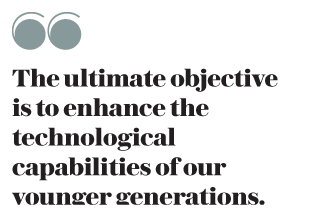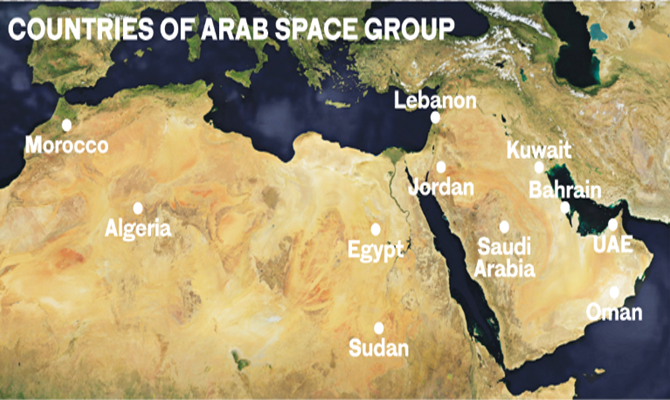ABU DHABI: The dream of an Arab space agency is one step closer to becoming a reality, after Saudi Arabia and 10 other countries signed the first pan-Arab agreement on coordinating national exploration programs at the Global Space Congress in Abu Dhabi last week.
The ruler of Dubai, Sheikh Mohammed bin Rashid Al-Maktoum, said that the group’s first project would be a satellite system to be built in the UAE.
“I personally believe in Arab talents,” he said on Twitter. “We called our new satellite ‘813’ in reference to the date that marked the beginning of prosperity for the House of Wisdom in Baghdad under the reign of Al-Ma’mun.”
The agreement is unprecedented for the nations involved, whose levels of technical expertise vary. The first aim of the agreement will be to bring them all up to an equal level of capability.
“It has taken a while because it needed leadership that was not there, but the UAE has now provided it,” said Dr. Mohammad Al-Ramadhan, director of the Research Directorate at the Kuwait Foundation for the Advancement of Sciences. “The initiative will develop and support the launch of satellites, which will be a gift to the Arab world, and will give scientists and engineers from Arab countries the chance to participate. With this fresh impetus and the opportunities it provides, the future will be different.”
A delegation from the Saudi Space Commission (SSC) was present at the event, to connect with regional partners and conduct research for the Kingdom’s own national strategy, which is currently under construction.
Established in late 2018, the commission’s role is to supervise and regulate the space sector in Saudi Arabia, working with partner organizations such as the King Abdulaziz City for Science and Technology, the Ministry of Defense, universities, the Communications and Information Technology Commission and the General Authority for Civil Aviation. The end goal is to make the sector profitable, eventually contributing to the economy and creating jobs.
“Arabs have a lot of potential in space exploration, especially because a large segment of our population, around 60-70 percent, is very young,” Al-Ramadhan said. “If we can use the revenues from our oil resources to fund our youth, we will definitely make our mark.”
The SSC’s national strategy, when published, will span 15 years, encompassing observation, navigation and communication satellite systems, human space flight, scientific research and exploration. It will be presented to the Saudi Council of Ministers for approval later this year.
“The world is already in an energy transition,” Al-Ramadhan added. “Countries are moving towards renewable energy, like hydrogen and solar power, buying electric cars, and we are slowly shifting away from oil. By diversifying our economy, it will definitely make a big difference in terms of moving from a reliance on oil revenue.”
The Kingdom has form in looking to the stars for inspiration — Riyadh famously put Sultan bin Salman Al-Saud into orbit in 1985, making him the first Arab in outer space.
According to Sheikha Al-Maskari, chief innovation officer at the UAE Space Agency, the move to establish a new Arab space group is a significant moment: “We hope to organize and energize the regional space sector. We also hope to share knowledge and expertise to further contribute to humanity’s ongoing quest to understand the universe in which we live.”
Senior figures from Kuwait, Algeria, Morocco, Egypt, Lebanon, Jordan and the UAE met during the event’s second day to discuss their respective progress. “Morocco started investing in space in the early 1980s, and one of its strategies was to merge all of its space programs to a single national agenda,” said Dr Edriss Al-Haddani, director general of the Royal Center for Remote Sensing in Morocco. “This will be a good starting point for all Arab space agencies to improve and develop their capabilities.”
Although Jordan does not have a dedicated space agency yet, the Royal Jordanian Geographic Center is tasked with updating maps and forecasts using satellite imagery. “When we talk about space programs, it has always involved collaboration between different bodies,” said Brig. Gen. Dr. Awni Al-Khasawneh, director general of the center.
“Collaboration between Arab countries is crucial to our collective success. It is a very positive initiative and we, as Arab countries, should take this opportunity to use all our resources in the best possible way.”
According to Al-Ramadhan, the most significant challenge facing any country embarking on space exploration is financial. “You need a huge budget,” he explained, “so the capabilities or resources of one country on its own will not be enough. The new initiative will be the most efficient solution to funding shortfalls, as well as helping to break the psychological barrier that such a field is the preserve of (great powers).
“The ultimate objective is not just to send astronauts to space, but to enhance the scientific and technological capabilities of our younger generations, who will have a mission to go even further. Space technology can help us find ways to mitigate climate change, for instance, while improving the quality of the environment and the air.”
The natural end point of such collaboration is the establishment of an official pan-Arab space agency. “The plan is to start cooperation and to build mutual projects to reach that point of creating this agency,” said Ghalib Faour, director of the Lebanese Remote Sensing Center. “Lebanon is a beginner in space, but we have a lot of potential in our universities, some of which are ranked among the highest in the region. We just need the (opportunity) to work on large projects driven by nations like the UAE.
“We tried many times before to build Arab cooperation for space exploration, but this is the first time I feel it is serious. Competition came in the way — 10 years ago, we tried with the Arab League to launch a constellation of Arab satellites, but we faced a problem over who would lead it. The UAE is now taking the lead, though, and they are supporting the rest of us.”
Faour expressed hope that space exploration would help to deliver sustainable development for Arab countries, especially those rebuilding after years of strife. “After the war in Lebanon, during the period of reconstruction, we had a lack of data,” he concluded. “So remote sensing, for instance, provided data for land use planning, environmental protection and monitoring of resources. The benefits greater space exploration will bring are endless.”



































